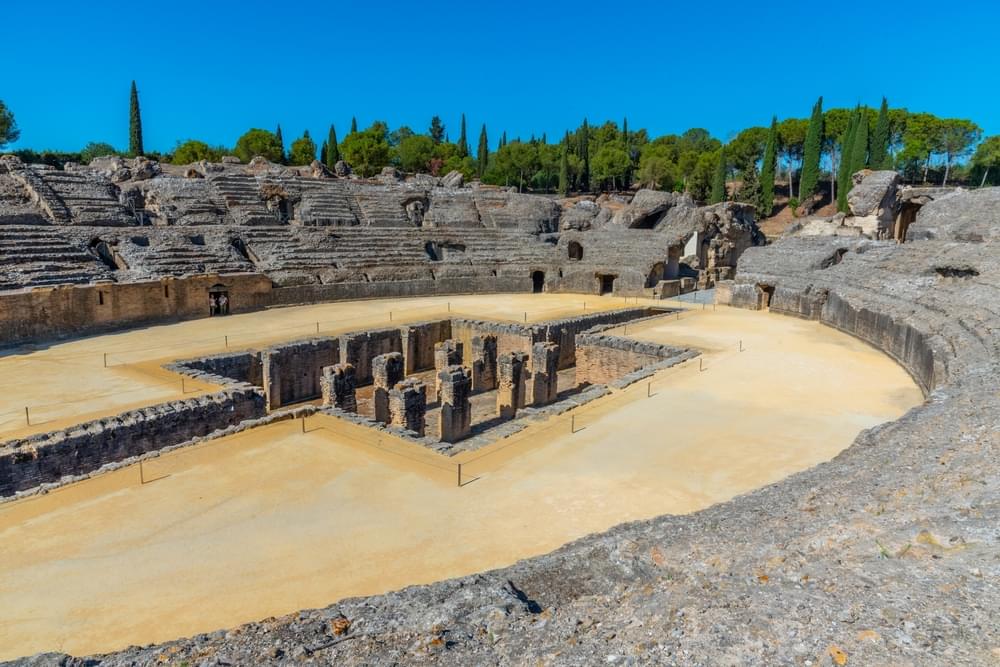About Amphitheatre of Italica
The Amphitheatre of Italica provides history enthusiasts with the opportunity to see one of the biggest amphitheatres that the Romans ever constructed. This Amphitheatre was built between 117 and 138 years and could accommodate up to 25,000 individuals.
People who tour the site can walk around the different levels of the amphitheatre, including the arena floor where various performances and events would have occurred. The Amphitheatre also contains a museum with various Roman artefacts on show.
The museum provides an opportunity to see some of the everyday items that Roman people used, as well as some of the more unusual items that were used for specific tasks or ceremonies. The Amphitheatre of Italica is a great example of Roman engineering.
It is oval-shaped and the seats are arranged in tiers around the central arena. The walls are made from large blocks of limestone that were cut to fit together without the use of mortar. The location offers visitors a look into the past, giving them a sense of what everyday life was like during the Roman Empire.
Also Read: Seville Tourist Attractions
Amphitheatre of Italica Highlights
• The Amphitheatre of Italica is a must-see for anyone interested in Roman history or architecture.
• Explore the site which includes a museum with a collection of Roman sculptures found at the site, as well as a reconstruction of what the amphitheater would have looked like in its heyday.
• The Amphitheatre of Italica was known as one of the biggest amphitheaters during the Roman Empire.
• The Amphitheatre of Italica was built between the years 117 to 138 under the reign of Hadrian.
• The Amphitheatre offers many different activities for people of all ages, so there is sure to be something for everyone.
How To Reach Amphitheatre of Italica
There are multiple ways of getting to Italica, in Santiponce and around 10 kilometers from Seville.
By car - This is the easiest way of reaching Italica. Moreover, there is a huge parking space right at the entrance.
By bus: The bus M-170A stops at the Square de Armas in Seville and stops at Italica. The outing requires around 45 minutes, although it also depends on the traffic.
Also Read: Barcelona Best Museums
Best Time To Visit Amphitheatre of Italica
All things considered, the best time to visit Italica is April, May, September, or October. The weather is ideal during these months – not too hot and not too cold. However, there are more tourists during these months. So, if you want to visit Italica without the crowds, the best time to go would be during June or July.
Must Checkout: Spain Tour Packages
Amphitheatre of Italica Other Essential Information
Tips to Visit Amphitheatre of Italica
- The ideal time to see the Amphitheatre is during the summer when the climate is warm and arid. The Amphitheatre is situated in a desert area and can get extremely hot during the summertime.
- If you're planning a summer visit, make sure to bring lots of water and sunscreen.
- Plan your visit ahead of time. Make sure to check opening times and ticket prices before you go.
- Consider the weather when picking out your outfit. The Amphitheatre of Italica is in Seville, Spain, which can get very warm during the summer. Wear clothes that will keep you cool and apply sunscreen if you're planning to visit then.
- Join a guided tour. You'll be able to learn about its history and see all the best parts by taking one of these tours.
If you are planning for a trip to Barcelona, then you can Checkout & Book: Barcelona Trips
Walls of Italica
The primary information we have of the walls of Italica which worked as a defence for the city is from the mid-first century BC. In any case, it was only after the second century AD, that they did not reach their maximum periphery, which is more than 3000 metres and has a thickness of 1.5 metres.
Recommended Read: What to Do in Seville Spain?
Theater
During the first century BC and the first century AD, the theatre was being used until the V century, when the city entered a deterioration. It was deserted through and through, making local people transform into pens and stockrooms and even a cemetery in bygone eras. It was only after 1970 when little examinations were begun and finished in 1980. It was reestablished a few times a while later, bringing about the Teatro de Italica, which celebrates the Theater Festival of Italica today.
Suggested Read: What to Do in Spain?
The Baths of Italica
One more place to see in Italica are the baths, which were shaped by two structures, the Termas Mayores or Termas de la Reina Mora, situated in the old city, and the Termas menores or Termas de Trajano, arranged in the new city, which tragically at the time was the most plundered region of the city. Each had various rooms, including hot water pools, cold water pools, warm water pools, and the shroud and exercise room.
Also Read: Top Places in Spain
Tourism Board Alliances
Amphitheatre of Italica FAQs
Which are some of the best Spain attraction tickets that we can book from Thrillophilia?
Here is the list of some of the best Spain attraction tickets that you can book from Thrillophilia:







